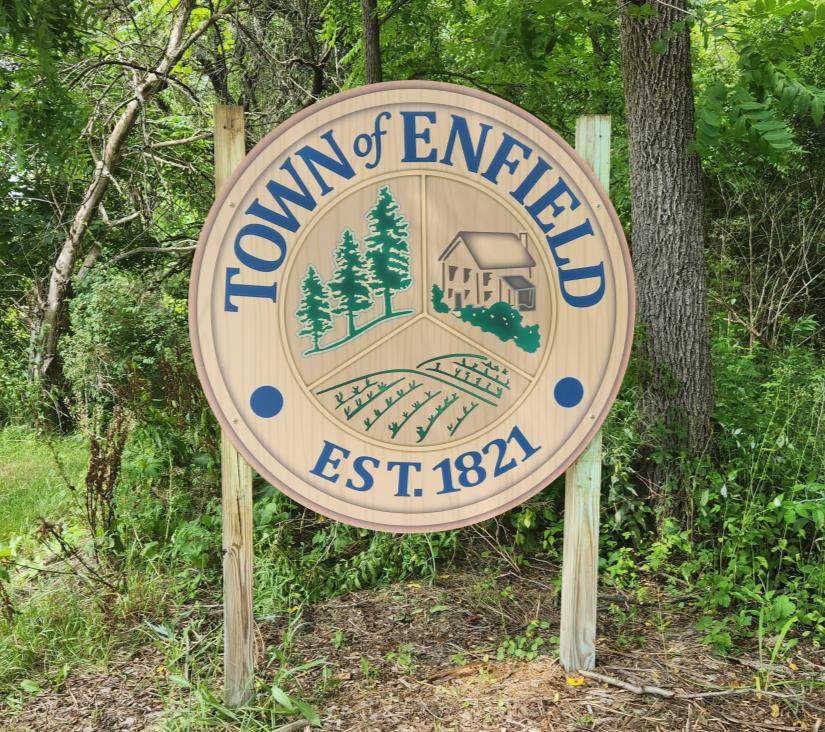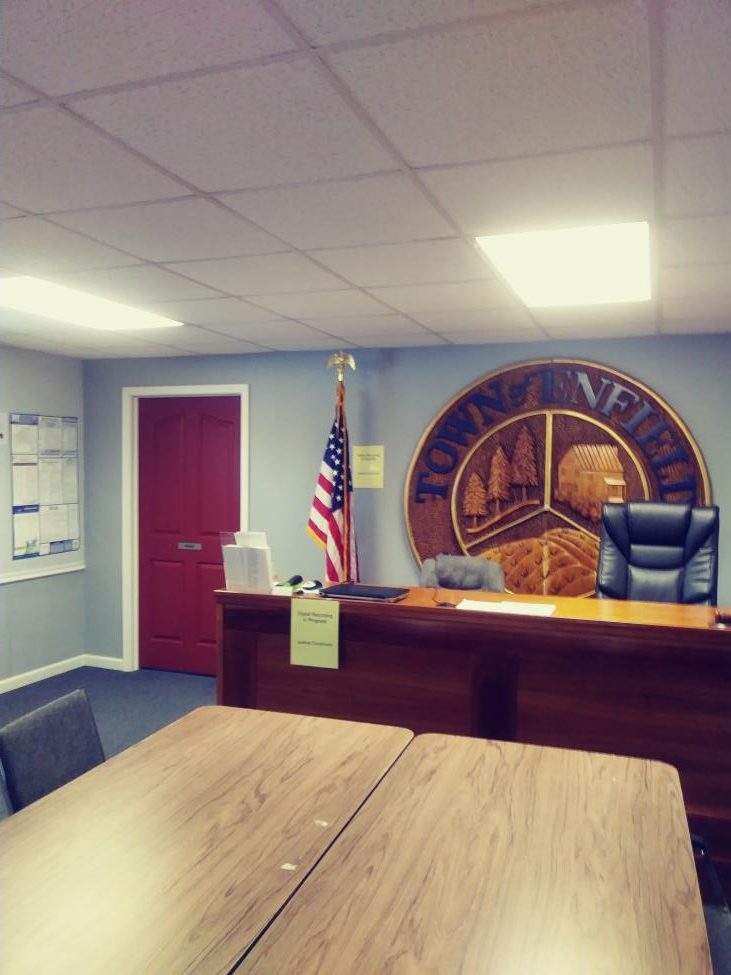by Robert Lynch; October 22, 2025; additional reporting October 25, 2025
Disagreements erupted, and the vote was not unanimous. But the Enfield Town Board Wednesday night adopted its final 2026 Town Budget following a public hearing where at least one commenter, a candidate for Town office, suggested that Supervisor Stephanie Redmond and Town Councilpersons serve next year without a pay raise and perhaps even work for free.

The $2.67 Million final Enfield budget would increase next year’s property tax levy by 6.53 percent. The tax rate, the amount per thousand that property owners pay per their assessments, would rise by 4.76 percent and stand next year at $6.84 per thousand.
The Enfield budget passed on a four-to-one vote October 22. Approval followed a sometimes-testy half-hour of discussion among Town Board members. Central to the controversy was Supervisor Stephanie Redmond’s last-minute initiative to transfer an additional $100,000 from an accumulated multi-year “Equipment Reserves” account into a budget line that Highway Superintendent Barry Rollins could spend at his discretion without Town Board review or consent.
As amended, Rollins discretionary equipment line will now have $375,000 in it for the superintendent to spend on machinery in 2026. The earlier “Preliminary Budget,” the one that was the actual subject of the evening’s Public Hearing, had set the spending line at $275,000. It had been only $140,000 in the initial 2025 Budget, but then climbed upwards during the year.
Councilperson Robert Lynch (this writer) equated the $375,000 equipment allowance to a “blank check.” He noted that Rollins could spend the money without consulting the Town Board, let alone getting its permission.
This Councilperson, Lynch, voted against the $100,000 transfer and also against the final 2026 Budget. He cast the lone vote in favor of an amendment, one suggested by a hearing commenter who’s also a candidate in this year’s elections, to have Town Board members forgo their planned three percent 2026 raises in the name of austerity.
“This budget… puts things ahead of people,” Lynch insisted, noting that at a prior meeting two weeks earlier, the Board’s majority had declined to increase annual salaries for Town Justice Heather Knutsen-King and her court clerk each by $530, but had no problem supporting a new $165,000 tractor for the Highway Department.

Other Town Board members, led by Redmond, resisted rolling back their own planned raises. Redmond maintained that adequate member pay encourages residents to serve in government and avoids having only persons of privilege running for office.
The pay-critical hearing commenter, Independent Councilperson candidate Robert Tuskey, faulted board members for not considering taxpayers as well as themselves.
Pointing to the projected nearly five percent increase in the tax rate, Tuskey said, “To me, that just hinders somebody’s ability to put food in the refrigerator and onto the table and keep their property more than you getting your little bit of an increase.”
Robert Tuskey and Rosie Carpenter are each challenging incumbent Councilpersons Jude Lemke and Cassandra Hinkle in this year’s Enfield Councilperson races. Carpenter also attended the hearing, but limited her comments to reciting the Pledge of Allegiance.
Supervisor Redmond defended the added $100,000 transfer of reserve funds to the Highway Superintendent’s equipment line, saying it “allows him to work more efficiently” in that Rollins can buy used equipment at auction without first returning to the Town Board and requesting a special meeting.
“I feel like he’s never led us astray with his purchases,” Redmond maintained. “He’s always been very capable of figuring out what we need and whether it’s a good deal,” she said.
Redmond qualified that “there’s an expectation” that Rollins would expend funds only on the machinery listed in a multi-year, sometimes-changing “Capital Plan,” a document attached to the 2026 Budget, yet not formally endorsed along with it. “So it’s not like he’s going to take it out and spend it at Walmart,” Redmond said of the superintendent’s purchasing authority.
The Capital Plan, however, does include the $165,000 new tractor.
“But let us say if he finds the new tractor, and ‘oops,’ the price has gone up; it’s now $225,000,” this Councilperson, Lynch, countered. “He’s got the money in that budget to write that check for $225,000.”

“That’s how policies work with these equipment lines,” Redmond explained.
“And that’s reckless,” this Councilperson rebutted.
While most accounts remain open to subsequent revision during the budgeted year, Rollins made clear during Wednesday’s meeting that once the reserve funds transfer to his equipment line, only he, not the Town Board, controls them. Even were the Town Board’s composition to change next year—which it may—the $100,000 infusion of cash could not easily be pulled back out.
It’s up to me,” Rollins insisted, “Highway funds are highway funds.”
Nonetheless, by law, equipment money unspent by the Superintendent during a calendar year would revert to the reserve account at year’s end. Budget documents presented the Board Wednesday placed the equipment reserves account currently at just over $321,000. Barring any subsequent rollover savings, the drawdown would shrink equipment reserves to $221,000 by this time next year.
Because the $100,000 Redmond requested for equipment is only a budget transfer—and not new money—the Board’s action has no immediate impact on the tax levy or the tax rate.
During both the Public Hearing and in later Board discussion, Supervisor Redmond pushed back on the idea of eliminating Town Board raises or to Robert Tuskey’s overture of returning to a bygone era when those governing a town served without pay.
“We feel the same inflation in our pocketbooks as everybody else does,” the Supervisor advised Tuskey at the hearing. Redmond then advanced a philosophical justification for increasing legislative pay.
“The other issue that I have with people not getting paid is then you have a very financially comfortable to the point of privilege viewpoint as our public servants,” Redmond said. “You cannot have somebody in a community that cannot afford to give their time away. You can’t have it from a single mom. You can’t have somebody that’s not supported otherwise either through marriage or whatever.”
“I think there is a significant population in Enfield of people that are underprivileged and need to have that voice recognized on their Town Board,” Redmond continued. “They need to have people on the Board that know what it’s like to choose between groceries and rent, and you know, anything you can put on their credit card.”
Still, Tuskey pressed his defense for citizen-service.

“It is what it is. Serve the people. Show ‘em how you’re committed,” Tuskey counseled the Town Board. “Find another way to do it. Where there’s a will there’s a way. Nothing is impossible.”
The candidate’s comment struck a nerve with one Board member.
“I feel like that’s an incredibly privileged thing to say,” Melissa Millspaugh, a teacher and a Board member who’s not up for re-election this year, countered Tuskey, “as two of the Board members here leave our small children at home every single time we’re here for hours.” Millspaugh has two young kids.
“I object to being called privileged,” Tuskey bristled.
Millspaugh clarified that she‘d referred to Tuskey’s comment, not to Tuskey himself. The candidate said he took the inference, nonetheless.
Town Clerk Mary Cornell intervened. She reminded Millspaugh that the hearing is for the public to speak, not necessarily for Board members to do so.
Near the end of budget discussions, this Councilperson, Lynch, moved to eliminate the three-percent raises that Supervisor Redmond and all Councilpersons would receive. The revision lost on a four-to-one vote. Had it passed, the revision would have saved the Town $812 in annual Supervisor’s pay, and a collective $467 among remaining Board members. Yet it would have sent a message.
Councilperson Cassandra Hinkle—one of two incumbents on this year’s ballot—seconded the Lynch motion for the salary rollback, but then voted against the reduction.
“I’m going to ask you to please not do that to yourself,” Supervisor Redmond counseled Hinkle regarding the pay cut,” because you have to think about people that are coming after you.” Redmond referenced the hypothetical unmarried woman who must pay out-of-pocket for health insurance and can’t “ride on” their husband’s policy.
“We’ve spent years trying to get caught up,’ Councilperson Jude Lemke said of efforts to raise Enfield officers’ pay to respectable levels. Lemke, a retired attorney, accepts no compensation. Yet she specifically urged against cutting Supervisor’s pay, a salary now set to rise in 2026 to $27,865.
“4.76 percent; that’s quite a bit,” another hearing commenter, Marcus Gingerich, said of the proposed, and later adopted, tax rate increase. Gingerich had spoken just one night earlier on Enfield’s Fire District expenses as the District’s Board of Fire Commissioners took its own testimony—and later adopted—a much-smaller, yet still increasing, $638,631 Fire District Budget.
To counter Gingerich, Redmond stated that reducing “anything else is going to be a cut to services.”
As for the Highway Department equipment funding transfer, Redmond never revealed her plans to all other Board members prior to convening the evening’s hearing. The initiative caught this Councilperson, and perhaps others, by surprise.
“I was going to support the budget tonight before the amendment came down,” this writer stated prior to his voting against the budget. “I can’t support it now, and I can’t support it primarily because… I’m voting implicitly for the 2026 Capital Plan which I cannot support.”
Supervisor Redmond that night repeatedly described the Town’s ten-year Capital Plan as a “living document.” Generally it does not receive a separate vote, and it didn’t receive one at Wednesday’s meeting. The last such formal vote, as recorded in the Town Minutes, was in November 2019, a time when Beth Magee was still Town Supervisor. For years, Supervisor Redmond had ignored drafting a Capital Plan until this Councilperson had prodded her to do so.
Nevertheless, as Town Bookkeeper Blixy Taetzsch clarified at the meeting, one’s voting in favor of the budget implies support for the capital purchases—including, most notably, the $165,000 mower tractor—that the Capital Plan expects budgeted funds will buy.
Last July, Highway Superintendent Rollins, with Town Board endorsement, sought to buy at auction a 2022 mower tractor that might have cost only half of what’s now budgeted. But his purchase attempts fell through, and the failure eroded relations between the Highway Superintendent and this Councilperson.

The new tractor would replace a 2004-2005 tractor that Rollins in September had listed in “good” condition on his equipment inventory.
“It’s not broken; it’s not hurting; it says maybe it could take $5,000 to fix up,” this Councilperson, Lynch, told Town Board colleagues about of the existing tractor, based on Rollins’ inventory. “Now maybe in the scheme of things for the Town of Enfield, a 2004 tractor, 2005 tractor is junk. I’ll tell you, for a good many farmers in Enfield, that tractor, 2004 tractor, would be just nicely broken in.”
“And I think we’ve got to learn that we’re not a rich town,” this Councilperson continued. “We’re not the Town of Ulysses; we’re not the Town of Dryden; we are not the Town of Ithaca. We don’t have the tax base. And our taxpayers are hurting, and they say, where can we cut?”
“I just think we are putting our priorities wrong,” this writer closed his argument, reminding the Board of its earlier refusal to increase Town Justice pay, yet supporting new highway machinery. “For a board that seems to think it cares about human beings, we are not caring about human beings. We are not caring about our Town Justice like we should, but we are caring about buying flashy new equipment that is replacing something that we could live with what we’ve got.”
“And that’s why I cannot support this budget,” the statement concluded.
Even had they wanted to, other Town Board members could not have raised Justice Knutsen-King’s salary that night. Once a spending plan advances to “Preliminary Budget” stage, as it had two weeks earlier, law prohibits further raises for elected officials.
Matters not mentioned at either the Public Hearing or during Board comment Wednesday, yet still significant within Town finances, were that for the first time the 2026 Enfield Town Budget has set aside funds for a quarter-time administrative assistant at the Highway Department.
From a fiscal perspective, the budget also draws down the projected available General Fund Balance—the Town’s savings account—to no more than $27,183 above the $250,000 threshold that past Town Boards, through policy, have insisted be reserved for emergencies.
To contain the 2026 tax levy, Supervisor Redmond had recommended, and the Board’s majority later agreed, to tap $182,500 from the existing General Fund Balance to cover operations for the year ahead. Should a similar amount be syphoned off one year from now in the 2027 budget, the available surplus beyond the established policy limit could be more than depleted.
Note: An earlier version of this story had misstated the age of the mower tractor that the new purchase would replace. As stated in various documents, the older tractor was purchased in 2004 or 2005. / RL
###

